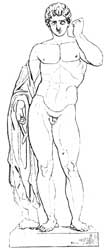Mercury

A Roman divinity of commerce and gain, probably one of the Dii Lucrii. The character of the god is clear from his name, which is connected with merx and mercari.1 A temple was built to him as early as 495 BCE,2 near the Circus Maximus;3 and an altar of the god existed near the Porta Capena, by the side of a well; and in later times a temple seems to have been built on the same spot.4 Under the name of the ill-willed (malevolus), he had a statue in what was called the Vicus Sobrius, or the sober street, in which no shops were allowed to be kept, and milk was offered to him there instead of wine.5 This statue had a purse in its hand, to indicate his functions.6 His festival was celebrated on the 15th of May, and chiefly by merchants, who also visited the well near the Porta Capena, to which magic powers were ascribed; and with water from that well they used to sprinkle themselves and their merchandise, that they might be purified, and yield a large profit.7
The Romans of later times identified Mercury, the patron of merchants and tradespeople, with the Greek Hermes, and transferred all the attributes and myths of the latter to the former,8 although the Fetiales never recognized the identity; and instead of the caduceus used a sacred branch as the emblem of peace. The resemblance between Mercury and Hermes is indeed very slight; and their identification is a proof of the thoughtless manner in which the Romans acted in this respect.
❧
The French name for Wednesday, mercredi, derives from his name.
Iconography
Mercury was portrayed identical to Hermes. An image can be found on a mural in a shop at the via dell' Abbondanza in Pompeii. There he is portrayed clothed in a wide robe, with wings attached to his sandals (talaria) and his cap, emerging from a temple and holding a purse, filled with coins, in his right hand. It is probably meant to ensure a profitable business for the shop owner.
References
Notes
- Paulus Diaconus, p. 124 (ed. Müller); Scholiast on A. Persius Flaccus' The Satires v, 112.
- Livy. The History of Rome ii, 21, 27; Ovid. Fasti v, 669.
- P. Victor. De Regionibus Urbis Romae xii.
- Ovid. Fasti v, 673; P. Victor. De Regionibus Urbis Romae i.
- Festus, pp. 161, 297 (ed. Müller).
- Scholiast on A. Persius Flaccus, l.c..
- Ovid. Fasti v, 670 ff.; Festus, p. 148 (ed. Müller).
- Horace. Carmina i, 10.
Sources
- Aken, Dr. A.R.A. van. (1961). Elseviers Mythologische Encyclopedie. Amsterdam: Elsevier.
- Smith, William. (1870). Dictionary of Greek and Roman Biography and Mythology. London: Taylor, Walton, and Maberly.
This article incorporates text from Dictionary of Greek and Roman Biography and Mythology (1870) by William Smith, which is in the public domain.